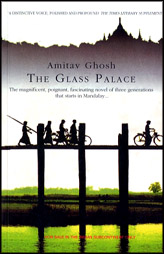Smoke and Ashes: A Writer’s Journey through Opium’s Hidden Histories
When Amitav Ghosh began his research for the Ibis Trilogy some twenty years ago, he was startled to find how the lives of the nineteenth-century sailors and soldiers he wrote of were dictated not only by the currents of the Indian Ocean, but also by a precious commodity carried in enormous quantities on those currents: opium. Most surprising of all was the discovery that his own identity and family history were swept up in the story.
Smoke and Ashes is at once a travelogue, a memoir and an excursion into history, both economic and cultural. Ghosh traces the transformative effect the opium trade had on Britain, India and China, as well as on the world at large. Engineered by the British Empire, which exported opium from India to sell in China, the trade and its revenues were essential to the Empire's survival. Upon deeper exploration, Ghosh finds opium at the origins of some of the world's biggest corporations, several of America's most powerful families and institutions, and contemporary globalism itself. In India the long-term consequences were even more profound.
Moving deftly between horticultural histories, the mythologies of capitalism and the social and cultural repercussions of colonialism, Smoke and Ashes reveals the pivotal role one small plant has played in the making of the world as we know it - a world that is now teetering on the edge of catastrophe.
---
'In thinking about the opium poppy's role in history it is hard to ignore the feeling of an intelligence at work. The single most important indication of this is the poppy's ability to create cycles of repetition, which manifest themselves in similar phenomena over time. What the opium poppy does is clearly not random; it builds symmetries that rhyme with each other.
It is important to recognize that these cycles will go on repeating, because the opium poppy is not going away anytime soon. In Mexico, for instance, despite intensive eradication efforts the acreage under poppy cultivation has continued to increase. Indeed, there is more opium being produced in the world today than at any time in the past.
Only by recognizing the power and intelligence of the opium poppy can we even begin to make peace with it.'
Smoke and Ashes is at once a travelogue, a memoir and an excursion into history, both economic and cultural. Ghosh traces the transformative effect the opium trade had on Britain, India and China, as well as on the world at large. Engineered by the British Empire, which exported opium from India to sell in China, the trade and its revenues were essential to the Empire's survival. Upon deeper exploration, Ghosh finds opium at the origins of some of the world's biggest corporations, several of America's most powerful families and institutions, and contemporary globalism itself. In India the long-term consequences were even more profound.
Moving deftly between horticultural histories, the mythologies of capitalism and the social and cultural repercussions of colonialism, Smoke and Ashes reveals the pivotal role one small plant has played in the making of the world as we know it - a world that is now teetering on the edge of catastrophe.
---
'In thinking about the opium poppy's role in history it is hard to ignore the feeling of an intelligence at work. The single most important indication of this is the poppy's ability to create cycles of repetition, which manifest themselves in similar phenomena over time. What the opium poppy does is clearly not random; it builds symmetries that rhyme with each other.
It is important to recognize that these cycles will go on repeating, because the opium poppy is not going away anytime soon. In Mexico, for instance, despite intensive eradication efforts the acreage under poppy cultivation has continued to increase. Indeed, there is more opium being produced in the world today than at any time in the past.
Only by recognizing the power and intelligence of the opium poppy can we even begin to make peace with it.'
Top rated books in this category














































